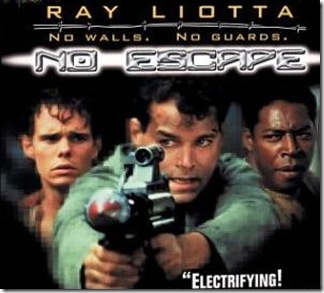Here we go again…
I found out this morning that a gunman in Upstate New York had taken a school principle hostage, fortunately it’s been reported via online sources that the gunman surrendered without incident. Thank God! You know? This stuff is starting to get old..real quick. Sometimes it seems as though there’s a lot of truth to the notion that your just not safe anywhere. Forgive me if I sound like an old fogey when I say that “I don’t recall so much violence being so common when I was a kid.” Perhaps I simply didn’t pay enough attention to the news.
You know? This stuff is starting to get old..real quick. Sometimes it seems as though there’s a lot of truth to the notion that your just not safe anywhere. Forgive me if I sound like an old fogey when I say that “I don’t recall so much violence being so common when I was a kid.” Perhaps I simply didn’t pay enough attention to the news.
I can recall in December of 1984, just weeks before CHRISTmas, Southwest Oklahoma was shocked by news of a grisly mass murder committed at a small bank located in Geronimo, OK. Law enforcement agencies would conduct a national manhunt; three days later tracking down suspects Jay Wesley Niell and Robert Grady Johnson in San Francisco, California.
August 20th, 1986; hearing later that afternoon on the car radio, the news of the Enid, Oklahoma Postal massacre that had taken place earlier that morning. Almost two years prior on 18 July, 1984, 22 people were murdered in the San Ysidro McDonald’s massacre. These incidents at the time, seemed like sporadic instances vs… an epidemic?
Then… there’s the Littleton, Colorado school shootings at Columbine High and then more recently the Virginia Tech rampage, which cause me to think that even at school, our children aren’t guaranteed safety. Isn’t there something, just wrong with that!?
But these aren’t isolated cases! On the “web” I found a compiled list of some of the violence committed in the past 13 years in schools, playgrounds and on campuses throughout the world.

It would seem that the norm is that people generally mind their own business and go about their daily routine, not thinking that a stop at the convenience store for gas or stopping at the local fast food restaurant may become a fatal decision…
December 1993, Colin Ferguson murders 6 and injures 19 other commuters on a Long Island Rail Road. Then there’s the Orlando, Florida and the Fort Hood, Texas attacks, still fresh on our minds, while memories of the DC/”Beltway” Sniper have been rekindled as the governor of Virginia has cleared the way for the execution of John Allen Muhammad.
Years ago, my knee jerk reaction to the “all of this” violence would be to look to the government for a solution; pass more laws, stricter penalties,”throw “em in jail, then throw away the key”; even going so far as willing to give up a few rights and liberties for safety. But that really isn’t the answer is it?

A possible downside of a governmental response? State police "securing" public schools? That sounds like a recipe for wayyyyyy too much control by a government. It is in my opinion, a flawed approach in that it doesn’t get to the heart of the matter. That matter being sin. The question I ask when I look at these instances of violence against co-workers, innocent bystanders, school mates etc; is this? “What in a person’s mind, gives them reason and the “right” to assume any authority to infringe upon the right of another to live?”
Sin does not however play nice with others. Sin doesn’t consider the welfare of others over one’s self. Sin is, self serving, and as we witness daily through stories of murder and terror; ultimately a destructive act, for not only the victims but also a slow (spiritual) suicide for the transgressor.
Isaiah the prophet spoke of a vision he had concerning Judah and Jerusalem, “funny” how familiar the words of Isaiah the prophet still seem to apply with the current state of the world, but particularly with regard to the US….
Isaiah 1:1-31
“… 21 See how the faithful city
has become a harlot!
She once was full of justice;
righteousness used to dwell in her—
but now murderers!
22 Your silver has become dross,
your choice wine is diluted with water.
23 Your rulers are rebels,
companions of thieves;
they all love bribes
and chase after gifts.
They do not defend the cause of the fatherless;
the widow’s case does not come before them. …”

Romans 1:28-32
28Furthermore, since they did not think it worthwhile to retain the knowledge of God, he gave them over to a depraved mind, to do what ought not to be done. 29They have become filled with every kind of wickedness, evil, greed and depravity. They are full of envy, murder, strife, deceit and malice. They are gossips, 30slanderers, God-haters, insolent, arrogant and boastful; they invent ways of doing evil; they disobey their parents; 31they are senseless, faithless, heartless, ruthless. 32Although they know God’s righteous decree that those who do such things deserve death, they not only continue to do these very things but also approve of those who practice them.

Grace and peace be with you.









A Teachable Spirit
A Teachable Spirit
~ Justin Taylor
Only one book is absolutely essential to save us, to equip us to obey God’s will, and to glorify Him in whatever we do. Only one book gives us undiluted truth — the whole truth and nothing but the truth. Only one book serves as our ultimate and final authority in all that it affirms. That book, of course, is the Bible, God’s Holy Word. No wonder John Wesley once exclaimed, “Let me be homo unius libri” — a man of one book!
And yet the irony is that if we use only this book, we may in fact be in disobedience to it. We should count good teaching about the Bible — whether through commentaries, books, sermons, study Bibles, and so on — to be a gift from God for the good of His church (see Ephesians 4:11; James 1:17). So what may look pious on the outside (“Just me and my Bible!”) can actually mask pride on the inside.
Acts 8 describes a story that might help us think through this. An Ethiopian eunuch — a God-fearing Gentile who served as treasurer to the Ethiopian queen — had made a five-month journey by chariot to Jerusalem in order to worship God. During his return trip he was puzzling out loud over the Isaiah scroll that he held in his hands. And the Holy Spirit appointed Philip to help him understand the meaning of the Bible.
Gentile who served as treasurer to the Ethiopian queen — had made a five-month journey by chariot to Jerusalem in order to worship God. During his return trip he was puzzling out loud over the Isaiah scroll that he held in his hands. And the Holy Spirit appointed Philip to help him understand the meaning of the Bible.
Philip first asked this man if he understood the passage that he was reading (chap. 53). The Ethiopian responded, “How can I, unless someone guides me?” (v. 31). After inviting Philip to sit in his chariot, he asked him about whom this passage spoke. “Then Philip opened his mouth, and beginning with this Scripture he told him the good news about Jesus” (v. 35). Soon after, the eunuch insisted they stop the chariot in order to be baptized by Philip in obedience to his new savior and king, Jesus Christ.
To be sure, this is a historical narrative recounting an event. The purpose is not necessarily to guide believers today in how to read their Bibles or how to think about the teaching of God’s Word. But the elements within it nonetheless correspond to some wise principles we can adopt as our own. So let’s work through the passage again, letting the various points serve as triggers for our own reflection on understanding the Word of God and those who teach it.
First, the Ethiopian wrestles with and labors to understand the meaning of God’s Word. He doesn’t wait for help; he first tries on his own to figure out what the text is saying. He is not content merely to skim the Scriptures, putting a check mark next to his reading in the scroll for that day. And so it is with us — we must spend time in the Bible, working hard and trusting God for insight into its meaning. Paul expressed this as a command followed by a promise: “Think over what I say, for the Lord will give you understanding in everything” (2nd Timothy 2:7).
Second, the eunuch humbly acknowledges his own insufficiency and lack of understanding. He desires to understand what the Word says, he admits that he needs help, and then he asks for it. We should approach God first remembering that He wants to be asked and that He promises to assist us: “If any of you lacks wisdom, let him ask God, who gives generously to all without reproach, and it will be given him” (James 1:5). And what should we pray? Psalms 119 provides many examples of how to pray for understanding and application. For example, verses 33–36:
Third, the eunuch asks a good, clear, relevant question based upon his own wrestling with the meaning of the text. Asking good questions is evidence of good thinking. If you don’t ask good questions about the text, you won’t engage your mind and you won’t be able to evaluate the answers.
Fourth, he listens carefully to the Christ-centered, gospel-focused teaching before him. Jesus warned that we must take care how we listen (Luke 8:18), and the Ethiopian eunuch does just that. For many of us, our inclination is to talk first and listen second, but Christ-followers must be “quick to hear” and “slow to speak” (James 1:19).
Finally, he puts into practice what he has just learned from the Word and from his commentator. Philip had told him “the good news about Jesus” (Acts 8:35), which probably included the teaching that members of God’s covenant community will publicly identify with Christ in the act of baptism. So the Ethiopian official models for us James’ command to “be doers of the word, and not hearers only” (James 1:22).
So let us be the sort of people who prayerfully and carefully immerse ourselves day and night in God’s Word (Joshua 1:8; Psalm 1:2). Let us also be the sort of Berean-like people who receive good teaching about God’s Word “with all eagerness, examining the Scriptures daily to see if these things were so” (Acts 17:11).
http://www.ligonier.org/learn/articles/teachable-spirit/
© Tabletalk magazine
Permissions: You are permitted and encouraged to reproduce and distribute this material in any format provided that you do not alter the wording in any way, you do not charge a fee beyond the cost of reproduction, and you do not make more than 500 physical copies. For web posting, a link to this document on our website is preferred (where applicable). If no such link exists, simply link to w
ww.ligonier.org/tabletalk. Any exceptions to the above must be formally approved by Tabletalk.
Please include the following statement on any distributed copy: From Ligonier Ministries and R.C. Sproul. © Tabletalk magazine. Website: www.ligonier.org/tabletalk. Email: tabletalk@ligonier.org. Toll free: 1-800-435-4343.